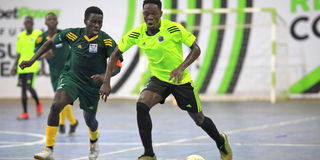Prime
A Shs328m gamechanger for futsal in half a year

The revamp of the Okla Futsal Arena created a more professional playing environment for the betPawa Futsal League. PHOTOS/GEORGE KATONGOLE
What you need to know:
This partnership has yielded a multitude of benefits for the sport that started in 2016 in Uganda since signing a Shs128m deal in November last year.
The futsal league has received a significant shot in the arm thanks to betPawa's hefty investment. Since becoming the official sponsor in November 2023 (the first official sponsor since the league's inception in March 2016), betPawa has injected close to Shs200 million into the Futsal Super League as winning bonuses.
This partnership has yielded a multitude of benefits for the sport that started in 2016 in Uganda since signing a Shs128m deal in November last year.
Ivy Nyonyozi Igunduura, Country Marketing Manager of betPawa Uganda said the impact has been transformative.
“The league has expanded from six to twelve teams, with betPawa's contribution facilitating rental fees, renovations, and branding of the Old Kampala Futsal Arena," she said.
All teams received uniforms, and the federation benefited from a digital scoreboard.
However, the most impactful aspect of betPawa's involvement might be the "locker room bonus" system. This financial boost directly empowers players, allowing them to dedicate more time and energy to training and development.
"The financial incentive has elevated the level of competition. Fans witnessed more strategic plays, improved skills, and a more professional atmosphere overall. This is a significant step forward for futsal in Uganda and we're excited to see the sport continue to flourish," she said.
Money league
The innovative Locker Room Bonus system provided financial incentives to participating teams. Each team's nine players and coach received a bonus of Shs150,000 for every win.
Park emerged as the league's financial leader, capitalising on their impressive performance. With 20 wins, they secured Shs30m in bonuses. Their two draws against Nansana Aska and Kabowa Dream Team added another Shs1.5m, bringing their total earnings to Shs31.5m.

Ivy Nyonyozi Igundura speaks during the launch of the partnership between the Futsal Association of Uganda and and betPawa at Serena Hotel in November last year.
Kisenyi finished with Shs24m from their 16 wins and two draws against Kabowa Dream Team and Kisugu. The 2023 champions, Lubaga Grameen, also earned Shs24m for their 16 wins.
Nansana Aska and Kisugu secured Shs18.7m and Shs18m respectively, reflecting their mid-table finishes. Kawempe, with just one win throughout the season, received the lowest bonus amount of Shs1.5m for their victory over Edgars.
Game changer
The Locker Room Bonus has improved player commitment, reduced forfeits, and boosted overall competitiveness in the futsal league.
"The bonus payments significantly reduced our club expenses," said Johny Bwambale, CEO of Kabowa Dream Team. "Knowing they'd be rewarded for wins encouraged players to prioritise training and avoid playing in other leagues."
This financial boost also trickled down to the players themselves. The bonuses allowed them to cover necessities like rent, boots, and shin guards.
The impact was evident in player availability. Only four games were forfeited throughout the season, a significant improvement. Luzira (missing games against Nansana and Mengo City), Nansana Aska and KJT (missing one game each) were the only culprits.
Catherine Namuyomba, the chairperson of Luzira, highlighted another benefit. "The bonus system allowed us to maintain a consistent coaching staff and core group of players throughout the season," she said.
Omarios Ali of Kisenyi echoed the sentiment, emphasising the motivational aspect.
"The bonuses encouraged players to work harder, adding an extra layer of motivation for every game," he said.
Mengo City CEO Abdul Karim Lakhan sees the bonuses as a catalyst for competition.
"It gave players a purpose to compete and stay focused. One of futsal's biggest challenges is compensating players. Shs150,000 per win was a real game-changer for a growing sport," Lakhan said.
Lessons
While the Locker Room Bonus has been lauded for its positive impact, some challenges emerged in its execution.
According to Hamza Jjunju, chairman of the Futsal Association of Uganda (FAU), roughly 70% of the bonus money has been distributed to players, with the remaining 30% facing delays.
"Inconsistencies in player registration, national IDs, and mobile money details led to some players missing their bonuses initially," Jjunju explained. "However, we're working to resolve these issues and ensure everyone receives their rightful share."
The bonuses were wired directly to players' mobile money accounts after each game. This caused temporary setbacks for those with discrepancies in their registration details.
The distribution model sparked debate among stakeholders.
Omarios Ali, a club official of Kisenyi, believes a "saving model" among players could have maximised the long-term benefits.
Abdul Karim Lakhan of Mengo City proposed an alternative approach. He suggests clubs handle the bonus payments, establishing a minimum player salary structure while retaining a portion for the club.
betPawa Futsal League
Money table
Park Shs31.5
Kisenyi Shs25.5m
Lubaga Shs24m
Luzira Shs19.5m
Nansana Aska Shs18.75m
Kisugu Shs18m
Mengo City Shs16.5m
Kabowa DT 12.75m
KJT Shs11.25m
Aidenal Shs9.75m
Edgars Shs9m
Kawempe Shs1.5m




